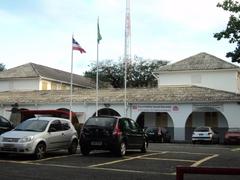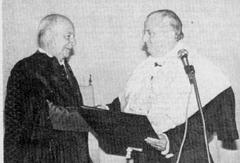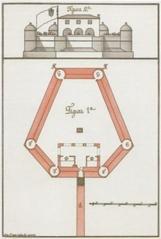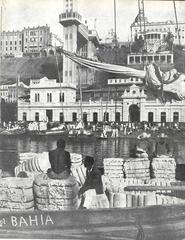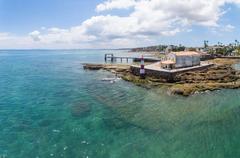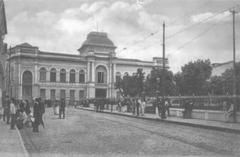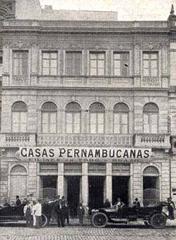Visiting Convento do Carmo: History, Tickets, and Tips
Date: 01/08/2024
Introduction
Nestled in the heart of Pelourinho, Salvador, Brazil, the Convento do Carmo stands as a beacon of historical, cultural, and architectural significance. Established in 1586 by the Carmelite Order, this site has witnessed pivotal moments in Brazilian history, including serving as a refuge during the Dutch occupation of Brazil from 1630 to 1654 (Wikiwand). The convent’s robust architecture, characterized by Lioz limestone from Portugal and an 18th-century silver-adorned high altar, is a testament to the opulence and craftsmanship of the colonial era (Wikipedia). Recognized as part of the Historic Center of Salvador, a UNESCO World Heritage Site, the Convento do Carmo not only underscores its global cultural importance but also invites visitors to explore its rich tapestry of history and heritage (Wikipedia). This guide aims to provide comprehensive insights into the convent’s historical importance, architectural marvels, visiting hours, ticket information, and travel tips, ensuring that visitors can fully appreciate the multifaceted significance of this iconic site.
Table of Contents
- Introduction
- Historical Importance
- Architectural Significance
- Cultural Significance
- Visitor Information
- Travel Tips
- Nearby Attractions
- Modern-Day Significance
- Educational Significance
- FAQ
- Conclusion
Exploring Convento do Carmo: Historical Significance, Visiting Hours, and Tickets in Salvador, Brazil
Historical Importance
The Convento do Carmo, established in 1586 by the Carmelite Order, is one of Brazil’s oldest and largest convents. It played a pivotal role during the Dutch occupation of Brazil (1630-1654), serving as a refuge for locals and a strategic military point. The convent’s robust walls provided safety and security, making it a critical fortress during turbulent times (Wikiwand).
Architectural Significance
An architectural marvel, Convento do Carmo showcases the evolution of colonial Brazilian architecture. The complex includes the Church of Our Lady of Mount Carmel, featuring a single nave and a layout typical of 17th-century church architecture in Bahia. Highlights include the high altar adorned with an 18th-century silver front and the use of Lioz limestone from Portugal, reflecting the period’s opulence and craftsmanship (Wikipedia).
Cultural Significance
Part of the Historic Center of Salvador, a UNESCO World Heritage Site, Convento do Carmo underscores its global cultural importance. The convent complex, including the adjacent Church of the Third Order of Mount Carmel, is a testament to Salvador’s rich religious and cultural heritage (Wikipedia).
Visitor Information
Visiting Hours: The Convento do Carmo is open to visitors from Monday to Saturday, 9:00 AM to 5:00 PM. It is closed on Sundays and public holidays.
Ticket Prices: General admission tickets cost R$20 for adults and R$10 for students and seniors. Children under 12 can enter for free.
Guided Tours: Guided tours are available for an additional R$15 per person, offering in-depth insights into the convent’s history and architecture.
Travel Tips
- Best Time to Visit: The best time to visit is during the dry season (December to March), when the weather is most pleasant.
- Getting There: The convent is located in the Pelourinho district, easily accessible by public transportation or taxi.
- What to Wear: Comfortable walking shoes and light clothing are recommended, as the area can be quite warm.
Nearby Attractions
- Pelourinho District: Known for its cobblestone streets, colorful buildings, and vibrant cultural scene.
- Elevador Lacerda: A public elevator connecting the lower city (Cidade Baixa) with the upper city (Cidade Alta) of Salvador.
- Mercado Modelo: A large market offering a variety of local crafts, souvenirs, and traditional Bahian cuisine.
Modern-Day Significance
In recent decades, the Convento do Carmo has been transformed into a luxury hotel, the Pestana Convento do Carmo. This conversion preserves the site’s historical and architectural integrity while making it accessible to a broader audience. The hotel offers modern amenities, including a swimming pool, gym, and spa, set within the historic convent buildings (Pestana Convento do Carmo).
Educational Significance
The Convento do Carmo serves as an educational resource, offering insights into colonial Brazil’s history, architecture, and culture. Visitors can learn about the Carmelite Order’s role in the region and the architectural styles that influenced the convent’s construction (Intl Travel News).
FAQ
What are the visiting hours for Convento do Carmo? The convent is open from Monday to Saturday, 9:00 AM to 5:00 PM, and closed on Sundays and public holidays.
How much do tickets cost for Convento do Carmo? General admission is R$20 for adults, R$10 for students and seniors, and free for children under 12.
Are guided tours available? Yes, guided tours are available for an additional R$15 per person.
Conclusion
The Convento do Carmo in Salvador, Brazil, is more than just a historical monument; it is a living testament to the rich cultural and architectural heritage of the region. From its role as a refuge during the Dutch occupation to its transformation into a luxury hotel, the convent seamlessly blends history with modernity (Pestana Convento do Carmo). Visitors can immerse themselves in the convent’s past through guided tours, explore nearby attractions in the vibrant Pelourinho district, and enjoy modern amenities within the historic walls. By understanding its historical, architectural, cultural, and educational significance, visitors can gain a deeper appreciation for this remarkable site. Plan your visit today and experience the unique blend of history and culture that the Convento do Carmo offers (Intl Travel News).
References
- Wikiwand, 2024, Author Wikiwand
- Wikipedia, 2024, Author Wikipedia
- Wikipedia, 2024, Author Wikipedia
- Pestana Convento do Carmo, 2024, Author Pestana Convento do Carmo
- Intl Travel News, 2024, Author Intl Travel News




